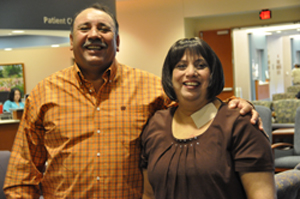Volunteer pilots help connect patients with treatment

When it came to deciding where to receive treatment for prostate cancer, Oscar Hernandez didn’t hesitate.
Same story 17 months later when his wife, Christina, was diagnosed with breast cancer. But figuring out how they would travel the 450 miles from their West Texas home in Sweetwater to
MD Anderson in Houston was another matter. Especially when faced with numerous costly trips.
Enter Grace Flight of America, an organization of volunteer pilots who provide free air transportation to people with medically related needs.
Working with MD Anderson’s Department of Social Work, the Hernandezes tapped into this service.
“We’re very grateful to the pilots who donate their planes and their time. Without their help, it would have been very hard on us financially,” Christina says.
While Oscar’s prostate cancer required surgery and a three-day hospital stay, Christina’s situation was more complicated. It involved chemotherapy treatments at MD Anderson spread over six months, followed by surgery and then 30 rounds of radiation during a final month-long stay in Houston.
Pilots give of their time
Fiona McDougall, a flight instructor and co-captain on a small private jet based in Houston, was one of several pilots who carried the couple. In fact, they were her first passengers as a Grace Flight pilot.
“Over the course of Mrs. Hernandez’s treatment, I picked them up as frequently as I could,” she says. “Having a chance to help someone in need like this is a very humbling experience.”

Oscar and Christina Hernandez
Pilots sign up for missions on the Grace Flight website. Occasionally, because of distance, more than one pilot and plane are needed to complete the final leg of a mission.
A hangar and patient/pilot center at Hobby Airport in Houston serve as the local Grace Flight headquarters, where staff coordinate up to 350 missions at a time. Since 2002, about 1,200 MD Anderson patients have been assisted, many of them more than once.
The Department of Social Work plays an integral role in the process by assessing patients’ financial needs, medical status and other factors. According to Lakshmi Naik, assistant director of the department, it’s worth the effort.
“Grace Flight and other volunteer organizations that provide air or ground transportation offer a great service to our patients,” Naik says.
Southwest, Continental provide a big lift
Private airplane pilots aren’t alone in opening their hearts, and wallets, to MD Anderson patients.
Southwest Airlines and Continental Airlines also have a history of providing big lifts to those in need.
Working with many participating hospitals, Southwest’s Medical Transportation Grant Program assists thousands of patients and family members traveling for medical treatment.
“We understand the strain that serious illness places on families, especially when necessary medical treatment is far from home,” says Debra Benton, director of Charitable Giving for Southwest. “Through this program, we offer help and ease some of their worries so they can focus on what’s important.”
Over the past few years, more than 1,200 MD Anderson patients and family members received free air travel from Southwest for a total donation value of about $500,000.
This assistance has made a difference for many patients. As one person shared on a feedback form, “These tickets are helping me afford to stay on the clinical trial that’s saving my life.”
Anyone using the Continental OnePass Frequent Flyer Program can donate miles to a number of organizations, including MD Anderson. The institution’s Travel Management Services redeems these miles for tickets.
In the past two years, about 7.5 million miles have been donated to MD Anderson, resulting in more than 160 tickets for patients and caregivers.
For both programs, Department of Social Work staff help determine which patients are eligible to receive assistance, based on financial need, medical condition and other factors.

















